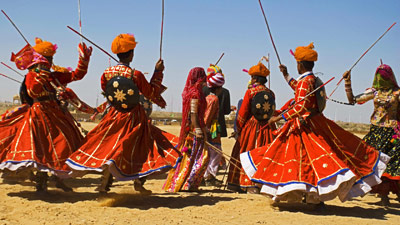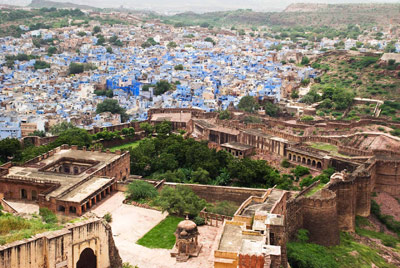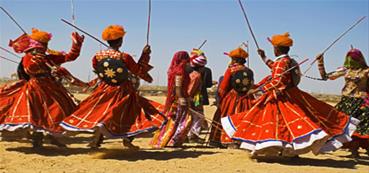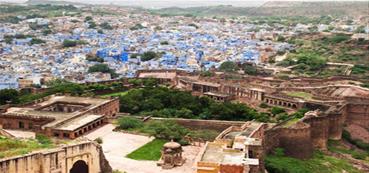DELHI: New Delhi, the capital and the third largest city of India is a fusion of the ancient and the modern. Standing along the West End of Gangetic Plain, the capital city, Delhi, unwinds a picture rich with culture, architecture and human diversity, deep in history, monuments, museums, galleries, gardens and exotic shows. Comprising of two contrasting yet harmonious parts, the Old Delhi and New Delhi, the city is a travel hub of Northern India.
Narrating the city's Mughal past, Old Delhi, takes you through the labyrinthine streets passing through formidable mosques, monuments and forts. You will also discover lively and colorful bazaars that boast to cater all sorts of good and items at mind-blowing prices amidst a barely controlled chaotic ambiance. The imperial city of New Delhi displays the finely curved architecture of British Raj. It generates a mesmerizing charm reflecting well-composed and spacious streets under the shade of beautifully lined avenues of trees and tall and imposing government buildings.
Meet our representative at the Airport who will transfer you to your hotel.
Upon arrival at the hotel, welcome with garlands.
Overnight at the hotel
Breakfast at the hotel
Late morning, leave for Mandawa by Car
Mandawa: A lovely, subdued little market town. Mandawa is an excellent base for exploring the region. It was settled in the 18th century, and fortified by the dominant merchant families Upon arrival, check-in at the Hotel
Overnight at the hotel
Breakfast at the hotel
Enjoy a guided city tour of Mandawa, the open air Art Gallery and visit the Havelis.
Havelis: The popular design was a building, which from the outside was relatively unremarkable, the focus being the one or more internal courtyards. This served the purposes of security and privacy for the women, as well as offering some relief from the fierce heat, which grips the area in summer. The plain exteriors also made the houses easily defendable. The main entrance is usually a large wooden gate leading into a small courtyard, which in turn leads into another larger courtyard. The largest mansions had as many as four courtyards and were up to six storeys high. Originally the colors used in the murals were all ochre-based, but in the 1860’s artificial pigments were introduced from Germany. The predominant colors are blue and maroon, but other colors such as yellow, green and indigo are also featured.
Afternoon free for personal activities
Overnight at the hotel
Breakfast at the hotel
Leave for Bikaner by Car
Bikaner: Rao Bikaji, a descendant of the founder of Jodhpur, founded this desert town in the north of the state in 1488. Like many others in Rajasthan, the old city is surrounded by high crenellated walls and was once an important staging post on the great caravan trade routes. The city is chiefly interesting for its superb large fort, but is also known for the fine camel’s bread here. Upon arrival, check-in at the hotel This afternoon, visit the Famous Bikaner Fort and later proceed to visit the Camel Breeding farm.
Junagarh Fort: It is an unassailable fortress, which had never been conquered. Built in 1593 A.D. by Raja Rai Singh, one of the most distinguished generals in the army of Emperor Akbar, the fort is a formidable structure encircled by a moat. The main entrance to the fort is Karan Pol [gate] that is facing east. Next to it is the Suraj Pol meaning the sun gate. In the fort complex are some magnificent palaces like Anup Mahal, Ganga Niwas and Rang Mahal or palace of pleasure. The Har Mandir is the majestic chapel for the royal family for worshiping their gods and goddesses. These palaces, constructed in red sandstone and marble, make a picturesque ensemble of courtyards, balconies, kiosks and windows dotted all over the structure. The premises also houses a museum, which has an array of rich collection.
National Research Center on Camel (10 km): Spend some time with the indispensable ship of the desert at the camel research and breeding centers which is only one of its kinds in Asia. The farm extends over 2000 acres of semi-arid land and is managed by the Government of India.
Overnight at the hotel
Breakfast at the hotel
Leave for Jaisalmer by car
Jaisalmer: Nothing else in India is remotely similar to Jaisalmer. Here, the yellow sandstone fort is an imposing sight, towering magnificently over the city. This desert fortress is straight out of the Tales of the Arabian Nights and you could easily be forgiven for imagining the you’d somehow been transported back to medieval Afghanistan. This magic, incomparably romantic and totally unspoiled city has been dubbed the “Golden City” because of the color imparted to its stone ramparts by the setting sun. Centuries ago, Jaisalmer strategic position on the camel train routes between India and central Asia brought it great wealth. The merchants and townspeople built magnificent houses and mansions, all exquisitely carved from wood and from golden-yellow sandstone. Although the Old city was once completely surrounded by an extensive wall, Jaisalmer largely escaped direct conquest by the Muslim rulers of Delhi, it did experience its share of sieges and sacking with the inevitable Jauhar being declared in the face of inevitable defeat.
Upon arrival, check-in at the hotel
Overnight at the hotel
Breakfast at the hotel
Morning visit the Jaisalmer Fort, also known as the Golden Fort.
Jaisalmer fort that stands about 100 meters over the city and beyond doubts, houses a citadel within its huge ramparts. Walking down the narrow cobbled stone lanes, one can feel the sheer magic of Jaisalmer. Several entrances called Pols, including the Ganesh Pol, Suraj Pol, Bhoota Pol and the Hava Pol guard the Megh Durbar and the Jawahar Mahal which were occupied by the royal family.
Also visit the Havelis (mansions of the rich merchants) have beautifully carved facades, jali screens and oriel windows overhanging the streets below. Visit Salim Singh Haveli (17 century) which is especially attractive with peacock brackets. Nathmal Haveli (1885) was built for the prime minister. Patwon Haveli (1805) is a group of five, built for five brothers. Possibly the finest in town. They have fine murals and carved pillars. A profusion of balconies cover the front wall.
Late afternoon, drive to the Sand Dunes and enjoy a Camel Ride on the Dunes to witness the Sun-Set.
The Sam dunes are the most picturesque spot around Jaisalmer, and perhaps the whole of western Rajasthan. Sitting there in the evening with the sun setting, listening to the ballads of the legendary lovers Moomal and Mahindra on the jew’s harp or the narh (a traditional musical instrument), you might feel that time has come to a grinding halt. The silken smooth sands of Sam look like a tale out of the Merchant of Venice and camel safaris are much in vogue here. There is a definite aura of romance about it.
Overnight at the hotel
Breakfast at the hotel
Leave for Jodhpur by Car
Jodhpur: At the edge of the Thar Desert, stands the 2nd largest city of Rajasthan – Jodhpur. The city is totally dominated by the massive fort, topping a sheer hill which rises right in the middle of the town. Founded in 1459 by Rao Jodha, a chief of the Rajput clan known as the Rathores. The Rathore kingdom was once known as Marwar, the Land of Death. It’s fascinating to wander around the jumble of winding streets in the old city. Eight gates lead out from the walled city. It’s one of India’s most interesting cities and, yes, it was from here that those baggy-tights horse-riding trousers, Jodhpuries took their name.
Upon arrival, check-in at the Hotel
Afternoon guided visit to the Mehrangarh Fort, Jaswant Thada and later walk through The Bazaars
Mehrangarh Fort– Perched on a 150m high hill, its sprawl is the most formidable and magnificent fort in Rajasthan. Rao Jodha founded it in 1459 but subsequent rulers of Jodhpur have also added to it over the centuries. A meandering road leads from the city 5 kms below. Battle scars of canon ball hit by attacking armies of Jaipur can still be seen on the second gate. To the left is chhatri of Kirat Singh Soda, a soldier who fell on the spot while defending the fort against the armies of Amber. There are seven gates, which include Jayapal meaning victory built by Maharaja Man Singh to commemorate his victories over Jaipur and Bikaner armies. Fatehpol also meaning victory gate was built by Maharaja Ajit Singh to mark the defeat of Mughals. The palm imprints still attract devotional attention and are covered by vermilion paste and paper-thin silver foil.
Jaswant Thada – On the way down from the fort, on left is Jaswant Thada, the graceful marble cenotaph of Maharaja Jaswant Singh II. His son Maharaja Sardar Singh built this monument known as the Taj Mahal of Marwar in the memory of Maharaja Jaswant Singh II of Jodhpur. The main memorial has been built like a temple with intricately carved marble stone. A visit to this structure is through the rocky hills giving it a secluded and a mystic aura.
Overnight at the Hotel
Breakfast at the Hotel
Leave for Udaipur by Car
En-route, visit the Jain Temples at Ranakpur
Ranakpur: is a captivating village which is located between the cities of Jodhpur and Udaipur. It lies in the Pali district of Rajasthan and is known for the spectacular range of Jain temples that can be found here. Ranakpur is a pilgrim destination which is indispensable in the itinerary of a tourist who is on his pilgrim tour of north India. Gather some important facts about Ranakpur that will prove to be of great help before you set out for a tour to this place.
Further drive to Udaipur.
Udaipur : Possibly no city in Rajasthan is quite as romantic as Udaipur, even though the state is replete with fantastic hilltops fortresses , exotic fairy-tale palaces and gripping legends of medieval chivalry and heroism. The French Impressionist painter’s, Brother Grimm‘s justification Udaipur is the “Venice of the East “
Founded in 1568 by Maharana Udai Singh, following the final sacking of Chittorgarh by the Mughal emperor Akbar, Udaipur rivals any of the world-famous creations of the Mughals with its Rajput love of the whimsical and its superbly crafted elegance. The city is full of palaces, temples and havelis ranging from the modest to the extravagant. There are plenty of parks and gardens, many of which line the lake shores. The city was once surrounded by a wall and, although the gates and much of the wall over the higher crags remain, a great deal of it has disappeared. The old city, bounded by the remains of a city wall, is on the east side of Lake Pichola.
Assistance on arrival and Check-in at the Hotel
Overnight at the Hotel
Breakfast at the Hotel
Morning visit the Fort and Royal Gardens
The City Palace built on the bank of the Pichola Lake, by Maharana Udai Singh in 1570. The impressive complex of several palaces is a blend of Rajput and Mughal influences. Half of it is still occupied by the Royal family, and part converted into a museum.
Sahelion-ki-Bari an ornamental pleasure garden specially made for the ladies of the palace in the 18th century. It has beautiful fountains, trees and flowers.
Late afternoon, enjoy a Boat Ride at Lake Pichola A man made lake, Lake Pichola is one of the prime attractions of Udaipur. The lake is known for the palace build amidst the lake. The lake was built by Maharana Udai Singh II. It was made basically for defense purpose. Cradled amongst hills, gardens, havelis, temples and ghats, Lake Pichola is the picturesque spotlight of Udaipur. The lake sports two islands palaces- Jag Niwas (Lake Palace) and Jagmandir. The lake is about 4 km long and 3 km wide, and not much deep- it often dries up in times of severe summers. The beauty of the lake and its surroundings can only be felt by seeing it, which increases many folds during sunrise and sunset
Overnight at the Hotel.
Breakfast at the hotel
Leave for Jaipur by Car
Jaipur: The capital city of the state of Rajasthan is popularly known as the “Pink City “because of the pink paint applied to the buildings in the old walled city. (In Rajput culture, pink was traditionally a color associated with hospitality.) The city owes its name, its foundation and its careful planning to the great warrior, astronomer Maharaja Jai Singh II (1699-1744). In 1727, with Mughal power on the wane, Jai Singh decided the time was ripe to move down from his somewhat cramped hillside fortress at nearby Amber to the new site. He laid out the city, with its surrounding walls and six rectangular blocks, according to principals of town planning set down in the Shilpa-Shastra, an ancient Hindu treatise on architecture
Upon arrival, check-in at the hotel
Late afternoon, enjoy a Rickshaw Ride thru the colorful Bazaars of Jaipur
Enjoy a Cycle rickshaw ride through the busy bazaars of the city area - Explore this part of Jaipur... that sells dreams and desires. Unravel this horizon that will not only fascinate you but also enthrall you with its dynamic colors aura.
Overnight at the Hotel
Breakfast at the hotel
Morning visit to Amber Fort, the marvelous example of Rajput architecture with its terraces and ramparts reflected in the Moat Lake below. The fort interior has various royal halls decorated with intricate ivory work, exquisite wall paintings and tiny mirror chips, which create a tantalizing reflection effect. En route, photo stop at the Hawa Mahal ( Palace of the Winds)
Afternoon visit the famous City Palace and the Observatory City palace museum – an imposing blend of traditional Rajasthani and Mughal Art. The museum is resplendent with its collection of robes of Royal Princes, carpets, an armory of old weapons, miniature paintings portraying court scenes, battle scenes and processions, Jantar Mantar (observatory) – which is the largest stone and marble crafted observatory in the world. Situated near the gate of the City Palace, the observatory has 17 curiously shaped instruments, many of them still in working condition.
Overnight at the hotel
Breakfast at the hotel
Leave for Agra by Cr
En-route visit Fatehpur Sikri
Fatehpur Sikri the deserted red sandstone city that was built by Emperor Akbar as his capital. It was a veritable fairy-tale city and its ‘ruins are still in a pristine condition. It is not hard to imagine what the court life must have been like in the days of its grandeur
Further drive to Agra
Agra became the capital of Sikander Lodi in 1501, but was soon passed on to the Mughals, both Babur and Humayun made some early Mughal constructions here. It was under Akbar that Agra first aspired to its heights of magnificence from 1570-85 he ruled from nearby Fatehpur Sikri , when he abandoned that city he moved to Lahore ( now in Pakistan ) but returned to Agra in 1599 , all later Mughal rulers ruled from Agra till 1761 it fell to the Jats who did much damage to the city.
Check-in at the Hotel
Overnight at the Hotel
Breakfast at the hotel
Morning visit the Taj Mahal (Taj Mahal is Closed on Friday)
Taj Mahal: If there’s a building, which represents a country – like Eiffel Tower for France, then it has to be the Taj Mahal for India.
Emperor Shah Jahan constructed this most famous Mughal monument made out of White marble in memory of his wife Mumtaz Mahal; it has been described as the most extravagant monument ever built for love. Started in 1631 it took 20,000 people, 22 years to complete this magnificent complex. The high red sandstone entrance gate is inscribed with verses from the Koran in Arabic, paths leading from the gate to the Taj are divided by long watercourse in which the Taj is beautifully reflected. The ornamental gardens through which the paths lead are set out along the classical Mughal lines of a square quartered by watercourses.
The Taj Mahal itself stands on a raised marble platform. Tall, purely decorative white minarets grace each corner of the platform. Twin red sandstone buildings frame the building when viewed from the river. The central Taj structure has four small domes surrounding the huge, bulbous, central dome. The tombs of Mumtaz Mahal and Shah Jahan are in the basement room.
Afternoon visit the Red Fort
Agra Fort: Construction of this massive fort was begun by Emperor Akbar in 1565, and additions were made up until the time of his grandson, Shah Jahan. While in Akbar’s time the fort was principally a military structure, by Shah Jahan’s time it had become partially a palace. There are many fascinating buildings inside the massive walls which stretch for 2.5 km, surrounded by a moat over 10 meters wide. The fort is on the bank of the river Yamuna, and only the south gate can be used to enter.
Overnight at the hotel
Breakfast at the hotel
Leave for Delhi by Car
Upon arrival, visit Shahjahanabad (Old Delhi) - the 300-year-old walled city, built by the Mughal Emperor Shah Jahan in 1648 as his capital. The focus of the city is the magnificent Red Fort and Jama Mosque built of red sandstone. Drive past the Red Fort from where the Prime Minister of India addresses the nation on India’s Independence Day. Visit Jama Masjid, the most elegant mosque in India that stands high on a hillock. In between and around these two focal points of the 17th century city is a thriving modern city in medieval setting. This area once had a tree-lined central avenue, with a canal dividing the thoroughfare.
Later, drive past the India Gate & Government Buildings and visit the Qutab Minar - at 72.5 meters the world's tallest brick minaret. Construction commenced in 1193 under the orders of India's first Muslim ruler Qutab-ud-din Aibak, and the topmost storey of the minaret was completed in 1386 by Firuz Shah Tughluq. The Qutab Minar is notable for being one of the earliest and most prominent examples of Indo-Islamic architecture. The complex is listed as a UNESCO World Heritage Site.
In time, transfer to the International Airport for your onward Flight.





